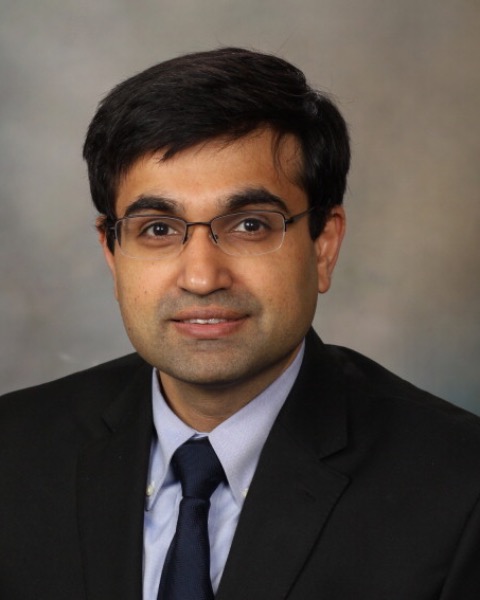Back
Oral Paper Presentation
Annual Scientific Meeting
Session: Plenary Session 4A - Colon / IBD
56 - An Interim Analysis of a Phase 3, Open-Label Study Indicates Efficacy and Safety of RBX2660 in Patients With Recurrent Clostridioides difficile Infection
Wednesday, October 26, 2022
8:40 AM – 8:50 AM ET
Location: Hall C2

Sahil Khanna, MBBS, MS, FACG
Mayo Clinic
Rochester, MN
Presenting Author(s)
Award: Outstanding Research Award in the Colon Category
Sahil Khanna, MBBS, MS, FACG1, Erik R. Dubberke, MD, MSPH2, Whitfield L. Knapple, MD3, Paul Feuerstadt, MD, FACG4, Maha Assi, MD, MPH5, Samson Ng, PharmD6, Beth Guthmueller, AS7
1Mayo Clinic, Rochester, MN; 2Washington University School of Medicine, St. Louis, MO; 3Arkansas Gastroenterology, North Little Rock, AR; 4PACT Gastroenterology Center and Yale University School of Medicine, New Haven, CT; 5University of Kansas School of Medicine, Wichita, KS; 6Ferring Pharmaceuticals, Parsippany, NJ; 7Rebiotix Inc., a Ferring Company, Roseville, MN
Introduction: Eligibility criteria in clinical trials are often narrowly defined and exclude broader patient populations representative of real-world clinical practice. Here, we report an updated interim analysis of PUNCH CD3-OLS, an ongoing, open-label phase 3 study evaluating the efficacy and safety of RBX2660, an investigational, microbiota-based live biotherapeutic for the reduction of recurrent Clostridioides difficile infection (rCDI) in participants with common comorbidities.
Methods: Participants enrolled in PUNCH CD3-OLS were ≥18 years old with medically documented rCDI, including first recurrence patients as determined by the treating physician and assessed with current standard-of-care diagnostic methods. Participants with comorbid conditions unrelated to gastrointestinal (GI) disorders, GI comorbidities (eg, irritable bowel syndrome (IBS), Crohn’s disease, and ulcerative colitis), and immunocompromising conditions were included. After standard-of-care antibiotics, participants received a single dose of RBX2660, rectally administered. Treatment success was defined as remaining recurrence-free for 8 weeks after treatment. Participants were monitored for recurrence and treatment-emergent adverse events (TEAEs) for at least 6 months after treatment. Demographic and safety data are presented for the safety population; efficacy data are presented for the modified-intent-to-treat population (mITT).
Results: At the time of this analysis, 483 participants had received RBX2660 treatment. The median participant age was 63 years (45.1% ≥65 years), 69.8% were female, 13.3% (64/483) and 1% (5/483) had IBS and IBD (unspecified), and 37% (37/483) and 3.7% (18/483) had Crohn’s disease and ulcerative colitis, respectively. Treatment success at Week 8 was achieved by 74.6% (300/402) of participants whose outcomes could be analyzed, consistent with the 2021 interim analysis (75%; 45/60). Among the RBX2660 responders (n=300) who completed 6 months of follow-up (n=262), 84% (220/262) remained CDI recurrence-free. TEAEs were reported by 69% (302/483) of RBX2660-treated participants; the majority of events were mild to moderate in severity. Most TEAEs were gastrointestinal in nature, with diarrhea and abdominal pain most reported.
Discussion: RBX2660 consistently reduced CDI recurrence at 8 weeks with a sustained clinical response through 6 months in a cohort of patients with broad eligibility criteria. RBX2660 was well-tolerated; TEAEs were mild to moderate severity.
Disclosures:
Sahil Khanna, MBBS, MS, FACG1, Erik R. Dubberke, MD, MSPH2, Whitfield L. Knapple, MD3, Paul Feuerstadt, MD, FACG4, Maha Assi, MD, MPH5, Samson Ng, PharmD6, Beth Guthmueller, AS7, 56, An Interim Analysis of a Phase 3, Open-Label Study Indicates Efficacy and Safety of RBX2660 in Patients With Recurrent Clostridioides difficile Infection, ACG 2022 Annual Scientific Meeting Abstracts. Charlotte, NC: American College of Gastroenterology.
Sahil Khanna, MBBS, MS, FACG1, Erik R. Dubberke, MD, MSPH2, Whitfield L. Knapple, MD3, Paul Feuerstadt, MD, FACG4, Maha Assi, MD, MPH5, Samson Ng, PharmD6, Beth Guthmueller, AS7
1Mayo Clinic, Rochester, MN; 2Washington University School of Medicine, St. Louis, MO; 3Arkansas Gastroenterology, North Little Rock, AR; 4PACT Gastroenterology Center and Yale University School of Medicine, New Haven, CT; 5University of Kansas School of Medicine, Wichita, KS; 6Ferring Pharmaceuticals, Parsippany, NJ; 7Rebiotix Inc., a Ferring Company, Roseville, MN
Introduction: Eligibility criteria in clinical trials are often narrowly defined and exclude broader patient populations representative of real-world clinical practice. Here, we report an updated interim analysis of PUNCH CD3-OLS, an ongoing, open-label phase 3 study evaluating the efficacy and safety of RBX2660, an investigational, microbiota-based live biotherapeutic for the reduction of recurrent Clostridioides difficile infection (rCDI) in participants with common comorbidities.
Methods: Participants enrolled in PUNCH CD3-OLS were ≥18 years old with medically documented rCDI, including first recurrence patients as determined by the treating physician and assessed with current standard-of-care diagnostic methods. Participants with comorbid conditions unrelated to gastrointestinal (GI) disorders, GI comorbidities (eg, irritable bowel syndrome (IBS), Crohn’s disease, and ulcerative colitis), and immunocompromising conditions were included. After standard-of-care antibiotics, participants received a single dose of RBX2660, rectally administered. Treatment success was defined as remaining recurrence-free for 8 weeks after treatment. Participants were monitored for recurrence and treatment-emergent adverse events (TEAEs) for at least 6 months after treatment. Demographic and safety data are presented for the safety population; efficacy data are presented for the modified-intent-to-treat population (mITT).
Results: At the time of this analysis, 483 participants had received RBX2660 treatment. The median participant age was 63 years (45.1% ≥65 years), 69.8% were female, 13.3% (64/483) and 1% (5/483) had IBS and IBD (unspecified), and 37% (37/483) and 3.7% (18/483) had Crohn’s disease and ulcerative colitis, respectively. Treatment success at Week 8 was achieved by 74.6% (300/402) of participants whose outcomes could be analyzed, consistent with the 2021 interim analysis (75%; 45/60). Among the RBX2660 responders (n=300) who completed 6 months of follow-up (n=262), 84% (220/262) remained CDI recurrence-free. TEAEs were reported by 69% (302/483) of RBX2660-treated participants; the majority of events were mild to moderate in severity. Most TEAEs were gastrointestinal in nature, with diarrhea and abdominal pain most reported.
Discussion: RBX2660 consistently reduced CDI recurrence at 8 weeks with a sustained clinical response through 6 months in a cohort of patients with broad eligibility criteria. RBX2660 was well-tolerated; TEAEs were mild to moderate severity.
Disclosures:
Sahil Khanna: Ferring Pharmaceuticals – Grant/Research Support. Finch – Grant/Research Support. Niche – Consultant. Pfizer – Grant/Research Support. Probiotech – Consultant. Seres Therapeutics – Grant/Research Support. Takeda/Shire – Consultant. Vedanta – Grant/Research Support.
Erik R. Dubberke: Abbott – Consultant. Ferring Pharmaceuticals – Consultant, Grant/Research Support. Merck – Consultant. Pfizer – Consultant, Grant/Research Support. Rebiotix – Advisory Committee/Board Member. Seres – Consultant. Summit – Consultant. Synthetic Biologics – Grant/Research Support.
Whitfield L. Knapple indicated no relevant financial relationships.
Paul Feuerstadt: Ferring/Rebiotix Pharmaceuticals – Advisory Committee/Board Member, Consultant, Speakers Bureau. Merck and Co – Consultant. Seres Therapeutics – Advisory Committee/Board Member, Consultant. Takeda Pharmaceuticals – Advisory Committee/Board Member.
Maha Assi indicated no relevant financial relationships.
Samson Ng: Ferring Pharmaceuticals – Employee.
Beth Guthmueller: Rebiotix, a Ferring Company – Employee.
Sahil Khanna, MBBS, MS, FACG1, Erik R. Dubberke, MD, MSPH2, Whitfield L. Knapple, MD3, Paul Feuerstadt, MD, FACG4, Maha Assi, MD, MPH5, Samson Ng, PharmD6, Beth Guthmueller, AS7, 56, An Interim Analysis of a Phase 3, Open-Label Study Indicates Efficacy and Safety of RBX2660 in Patients With Recurrent Clostridioides difficile Infection, ACG 2022 Annual Scientific Meeting Abstracts. Charlotte, NC: American College of Gastroenterology.


